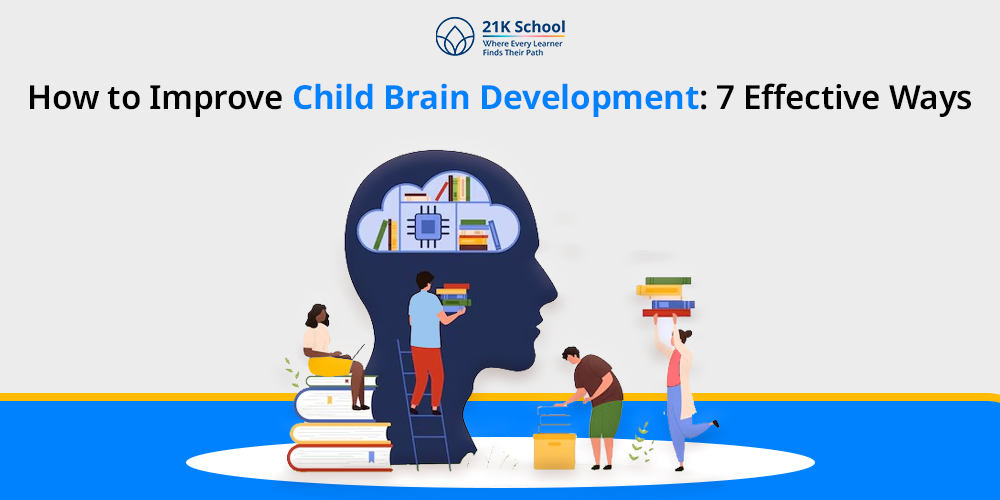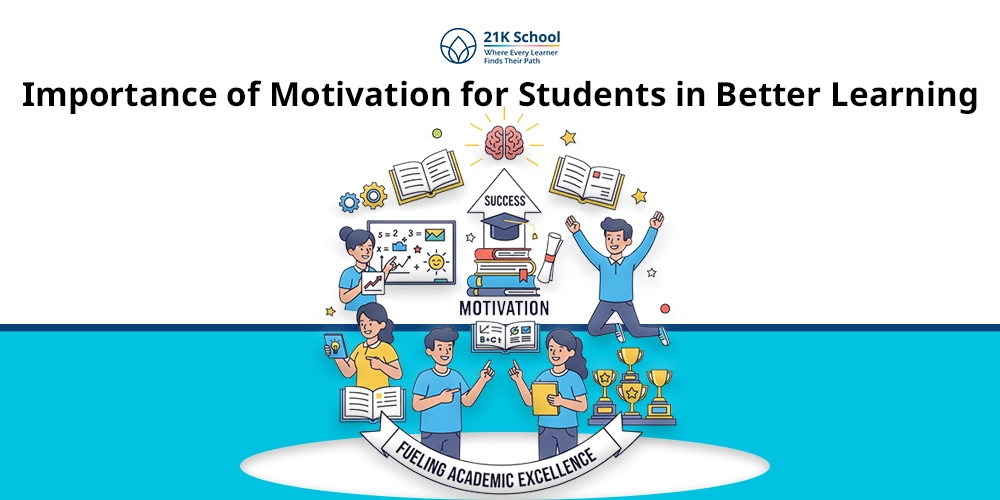
Have you seen some children as extremely smarts and some not even reaching the average performance as a kid?
The hidden fact behind this can be major and named as a problem in child brain development. Parents, teachers, and also care takers should note the significance held by the brain development alone in a child.
Along with cultural, genetic, and nutritional factors, proper care is also essential so that brain development feels protected to grow in a positive learning environment.
This article will let you understand the factors that affect brain development and how we can improve that after introducing you to the term child brain development.
Table of Contents
- What is Child Brain Development?
- How to Improve Child Brain Development: Effective Ways
- 1. Essential Nutrition for Optimal Brain Development
- 2. Movement and Exercise for Cognitive Growth
- 3. Critical Role of Sleep in Brain Development
- 4. Engaging Activities to Boost Cognitive Development
- 5. Building Social-Emotional Intelligence
- 6. Navigating Technology for Brain Development
- 7. Environmental Factors That Support Brain Development
- Key Takeaways
What is Child Brain Development?
A child’s brain development is continued till he/she becomes an adult, as the brain grows in size and increases its neural cells.
The factors affecting billions of neuron formation are critically centred around providing a safe environment, positive parent child relationship, child’s exposure and nutritional intake.
How to Improve Child Brain Development: Effective Ways
Multiple dimensions affect child brain development and which is why effective ways are also multiple. They can be considered as:
1. Essential Nutrition for Optimal Brain Development
The pack of nutrients needed by kids are more or less similar to that of adults, but the brain development requires more of them like:
- Breastfeeding benefits: Breastfed milk is the best source of nutrition for kids, either it is for developing immune system (through colostrum) or brain development (increase in white matter, hence social emotional learning enhance).
- Introducing solid foods: Bringing solid foods into your kid’s plate can stimulate the brain development to better extents. These foods must compile as fish food, eggs, oils, etc. and give him the nutritional value the brain needs.
- Fish and seafood: Seafoods and fishes are great options for building and developing connections between brain cells and tissue formation.
- Eggs and dairy: Brain growth and memory are vital functions aided by the dairy products and eggs in early ages of development of a child’s brain.
- Leafy greens and colorful vegetables: When you feed your kid with leafy vegetables and other greens having folate, the brain development along with the central nervous system gets boosted to form and develop simultaneously.
- Whole grains and complex carbohydrates: All the rotis, breads, and other complex carbohydrates are for developing your kid’s brain.
- Nuts, seeds, and legumes: The zinc found in nuts, seeds and legumes are highly beneficial for the brain’s formation and development that your child requires for better growth and independence.
2. Movement and Exercise for Cognitive Growth
The association of brain development and cognitive learning might be impossible without adequate movement and exercise in the body of toddlers. The following are the ways and types of exercise to be performed by children as they grow:
- 0-2 years: Cognitive Growth is slow and steady during this period of a child and is mostly given nutritional food mentioned above. It further allows them to learn walking and talking to people.
- 2-4 years: Physical exercises are really targeted as it improves thinking abilities, gross or fine motor skills of children by attending to running, walking, and jumping.
- 4-6 years: At the onset of these ages, a higher level of support introduction should be given to learning better activities like swimming, dance, etc. With these arrangements the brain health is positively affected assisting memory formation, and coordination in kids.
- 6-8 years: Children are now well developing some mastery in slightly more professional skills such as team sports, some martial arts or others that involve them in cycling. These are well suited for kids to enhance the blood flow in the brain and thus their cognition, also only if practiced for at least 60 mins daily.
Also read the importance of playing team sports.
- Weather-independent options : Some activities which are weather-independent and should be practiced by children at their homes are indoor games, aerobic exercises, etc. stimulating brain cells into being continuously active to train into memory and retention.
- Nature-based activities: To understand and feel natural benefits of activities associated with nature include walking, cycling, etc. into schedules of children. After performing these activities only you will understand how impactful it is in relieving student stress and restructures their cognitive skills.
- Equipment-free exercises: Equipment-free exercises are easy in practice and also to execute as they do not require any prior preparation to gather any prop and joins along to foster brain growth and retention. Examples of such games can be dancing, exercises, deep breathing, etc.
3. Critical Role of Sleep in Brain Development
Sleep is vital for every human being at any age, but it develops brain development in your wards. The sleep hours requirement for your kids by their age is given below:
- Infants: A necessary sleep having 12-16 hours of sleep in a day is what doctors suggest for infants. Between 0-3 months of age sleep assists in memory, physical preparedness for growth and sensation.
- Toddlers: 11-14 hours of sleeping tight is recommended for toddlers building their neural systems, memory consolidation, and synaptic pruning.
- Preschoolers: Preschoolers require much more than just memory formation or brain development. They need deleting older neural connections to make space for learning new in upcoming age and thus sleep for 10-13 hours.
- School-age: The problem-solving techniques and confident personality comes to children to support them in school where 9-12 hours of sleep is taken by school-age students.
Also read, how many hours of sleep is enough for students.
- Sleep hygiene practices: A regular and easy-going practice of sleep routine is habituated in learners so that it becomes a habit and manages their requirements of sleep ahead. You can have your own sleep ritual like making your bed, practicing mindfulness activities for students, etc.
- Screen time limitations: With the induced exposure to screens, the sleep cycles and routines are highly disturbed in today’s generation of kids. Give your kids a strict plan of viewing and time for watching screens after which they are supposed to sleep anyhow.
4. Engaging Activities to Boost Cognitive Development
To develop your kid’s cognition and brain of it, you can teach them to play and enjoy the below mentioned activities that will make them sharper:
- Interactive reading: Reading books, articles, magazines, etc. are towards developing best habits to culture cognitive development of the brain and reading skills of your wards.
Here are the top 10 benefits of reading books.
- Drawing and painting: Paintings and drawing favours the therapeutic need of the body and the brain of your kid. You can introduce them to such activities from childhood so that they feel home for their creative thinking and for self-expression.
Explore creative drawing and painting ideas for kids.
- Music and brain development: It is said that mostly if you even hum a song, it starts releasing your stress and releases serotonin in your brain and body and keeps it safe also.
- Puzzles and brain teasers: You might have seen some students extremely bright and talented in academics and even in extracurricular activities. These children mostly love to solve riddles, puzzles and brain teasers that sharpen their memory and brain muscle training.
- Building blocks and construction: Building blocks are another playful activity that encourage creativity and build cognitive and analytical skills of your children.
- Board games for cognitive skills: You might remember playing ludo, chess, or others and how it pushed you into practicing critical thinking and developing your brain cognitively.
- Sensory bins and play: Sensory bins are great ways to teach emotional regulation and identification to your children. It also adds up for their cognitive skills building.
5. Building Social-Emotional Intelligence
Look into the following techniques that can give your child the benefits of social-emotional learning (SEL) and also cognitive development:
- Emotion recognition and naming: The cognitive part of the brain is incomplete if it does not learn how to recognize your own emotions and name. This practice holds such importance because as humans, emotions are a central trait of us and we need to deal with them efficiently.
- Conflict resolution skills: From a very young age a child should be taught how to hold his ground and still be out of a conflict to maintain healthy relationships and brain development.
- Self-regulation technique: A self-managed person, even if it’s you only, will see a healthier mind and cognitive development of your brain since it will resist unwanted chaos and bring uniformity into life. Know more about self-regulated learning here.
- Playdates and peer interaction: When you encourage your kid to go for play dates with his/her peers, it develops a sense of understanding and emotional security in them. This is further appreciable for learning collaboration skills cultivating emotional intelligence in their brains.
- Family bonding activities: Family spending time together is one of the best activities that culture positive relationship understanding and emotional security in small children. Cognitive development in children follows the trail of learning.
- Community involvement: Participation in community events, and plays can foster the development of emotional literacy and also cognition in your kids. Stay in action of such participation and learn how to build confidence in children.
- Cultural exposure benefits: A healthy system of living and cultural exchanges enlarge the capacity of cultural awareness and become a good citizen through initial brain development.
Technology resides now with us now like a member only and no child is untouched from its use because of early exposure from parents. These situations can be twisted in our favour if we follow some real guidelines and rules.
- Screen Time Guidelines by Age: The first step should be to use screens and gadgets according to the need of the hour as in your kids by their age.
- 0-18months: There shouldn’t be any screen time for kids that are newly born and it’s strictly criticised even in small families.
- 18 months-2 years: These kids are still small and innocent enough to get the harsh exposure of the digital world. You can switch on to leveraging technology for interactive online teaching under parental support by selecting co-viewing and high-quality programming.
- 2-5 years: Now your kid can use the phones for 1 hour only and not more than that as it can hamper their growth and development of the brain.
- 5-teen years: Apart from tasks given for their homeworks or assignments, you can give your kid a free hour of break with mobile phones for a maximum of 2 hours. However, the focus here should be on quality screen time.
- Educational Technology Options: It is necessary that you introduce your kids with today’s technology as they would need anyhow in their later future but also with proper guidance and care.
- Technology that facilitates learning in your children can be AI chatbots, computers, interactive learning games, etc. You might also see the progress your kids show in the holistic education they get through it and get better at academics and at presenting themselves anywhere.
- Balancing Digital and Real-World Experiences: The responsibility of parents is huge when it comes to teaching your children healthier ways of depending on gadgets and finding real bonds and building them to support actual brain development. Rules of limited screen time, rigid study routine while also giving them space outside of their phones to explore the real world and find their true self ahead is vital as well.
7. Environmental Factors That Support Brain Development
Coming to thinking about the environment, you should know some basic avoidances and inclusions so that your child grows in a healthy setting and their brain develops fully as in cognition and creativity.
- Physical Environment Optimization: For brain development and relaxation, a child needs a healthy and safe environment where there is only a required amount of exposure to digital things and more focused on nature. Real growth of the brain follows when your child is involved in understanding real bondings and stays away from harmful chemicals or toxins.
- Emotional Environment Considerations: The cognitive development of the brain is only possible when the emotional needs of your child are met regularly and consistently. This suggests that you need to maintain a healthy emotional involvement with your kids and family members.
High stressors that release cortisol/stress hormone in kids restricts their growth as an individual since their brain gets possibly affected poorly.
Key Takeaways
All in all, to encourage brain development of your kid from an early age is easy if we stay mindfully and aware of the necessities in diet, physical activities, technological exposure, and emotional awareness.
Children are too small to know and decide what’s best for them. Only a good parent who is really devoted and focused on their child’s brain development like you can actually make a difference and make healthy grown up individuals.
So you can not down these guidelines and restrictions that would support your child becoming healthier and happier along with acquiring 21st century skills for students.


